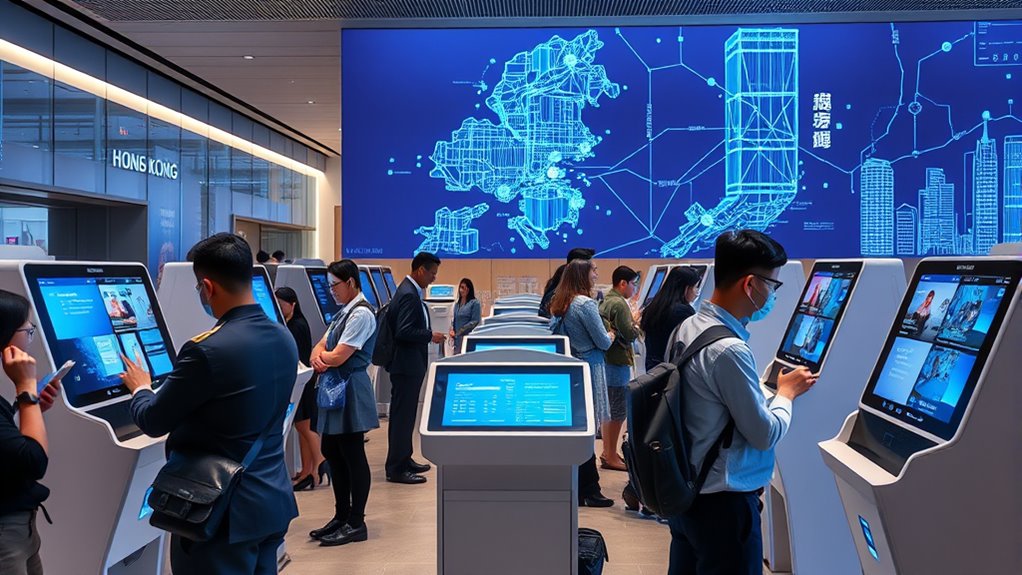Hong Kong plans to integrate AI into over 200 public services to boost efficiency, transparency, and citizen engagement. This initiative aims to transform service delivery, making it faster, more accessible, and responsive to residents’ needs. By expanding AI use in sectors like healthcare, city management, and transportation, the government seeks to improve overall public experiences. If you keep exploring, you’ll discover how these changes are shaping Hong Kong’s smart city future.
Key Takeaways
- Hong Kong plans to implement AI across over 200 public functions to enhance service efficiency and accessibility.
- The government is developing a comprehensive AI legislative framework ensuring accountability, privacy, and fairness.
- AI deployment aims to improve citizen engagement, transparency, and responsiveness in public service delivery.
- Investment initiatives include talent development and research funding to support AI integration in government sectors.
- Regulatory bodies and community projects are being established to oversee and promote responsible AI use in public services.

Hong Kong is making significant strides to incorporate artificial intelligence into its public services, aiming to improve efficiency, transparency, and citizen engagement. The government recognizes that integrating AI can transform how services are delivered, making them faster, more accessible, and more responsive to residents’ needs. To support this vision, Hong Kong is developing a comprehensive AI legislative framework that emphasizes accountability, fairness, privacy, safety, and human oversight. This dedicated AI ordinance aims to create a balanced, people-centric approach that fosters innovation while safeguarding citizens’ rights. Consistency across regulations and guidelines is vital, especially as businesses prepare to deploy AI solutions. To guarantee cohesion, a unified AI regulatory body is proposed, bringing together government agencies, industry experts, academia, cybersecurity specialists, and legal professionals. This body would streamline governance, facilitate international alignment, and position Hong Kong as a global AI hub.
The government’s policy direction underscores strong support for AI research and development. The 2025 Policy Address promotes leveraging local talent and mobilizing capital to attract investments into AI enterprises. Strengthening data assets is also prioritized, recognizing that rich, clean data fuels AI applications across sectors. The government envisions expanding AI deployment in healthcare, city management, transportation, and other public services. By seamlessly integrating AI into over 200 public functions, Hong Kong aims to accelerate service delivery, cut bureaucratic delays, and enhance the overall citizen experience. AI-powered data analytics will support evidence-based policymaking, enabling more informed decisions and optimized resource allocation. Digital transformation of public services will improve accessibility, transparency, and responsiveness, ensuring residents can interact with government agencies more conveniently.
Legal reforms are underway to eliminate barriers that hinder AI adoption. Led by Chief Executive John Lee, these reviews focus on updating laws related to data privacy, intellectual property, and liability issues linked to AI applications. These reforms aim to establish a supportive legal environment that encourages innovation while protecting the public. Complementing these efforts, Hong Kong has allocated HK$3 billion to a Frontier Technology Research Support Scheme. This scheme targets universities and research institutions, attracting top-tier international talent to lead advanced AI studies and projects. It also fosters innovation in frontier technologies, aligning with Hong Kong’s goal to become a regional innovation hub. Talent development programs will build local expertise and enhance Hong Kong’s competitiveness in AI. Additionally, the city recognizes the importance of DIY enthusiasts in contributing to local innovation and community engagement through technology-driven projects.
Frequently Asked Questions
How Will AI Impact Employment in Hong Kong’s Public Sector?
AI will positively impact your public sector employment by enhancing your roles and increasing demand for your AI-related skills. You’ll see job roles evolve, focusing more on data analysis and AI-human collaboration. As AI boosts efficiency, you’ll need to reskill continuously, but your expertise will be valued higher. Government initiatives support your growth, and AI acts as an empowering tool, helping you address complex challenges while maintaining your creativity and societal contribution.
Are There Privacy Concerns With AI Handling Personal Data?
AI handling personal data is like walking a tightrope — there are real privacy concerns. You need to guarantee proper controls, clear policies, and human oversight to prevent data breaches or misuse. If you don’t, sensitive information could be exposed or mishandled. Regular audits, staff training, and transparency are essential to protect privacy and maintain trust while leveraging AI’s benefits in public services.
What Training Will Staff Need to Operate New AI Systems?
You’ll need thorough training to operate new AI systems effectively. This includes understanding AI principles, workflows, and operational guidelines, especially for tools like chatbots, OCR, and speech-to-text. You’ll also learn how to troubleshoot issues, optimize AI use, and adapt to new features as technology advances. Additionally, training on data privacy, ethical use, and security protocols ensures responsible handling of personal data and aligns with government policies.
How Will AI Ensure Equitable Service Access Across Communities?
“Unity is strength.” AI guarantees equitable service access by standardizing quality and offering personalized support, especially for underserved communities. You’ll see AI-powered tools that break down language barriers, accommodate disabilities, and provide remote access, making services more inclusive. By monitoring and adjusting these systems, the government can address disparities and prevent bias, ensuring everyone benefits fairly. This way, AI helps build a more equitable, connected society for all.
What Measures Are in Place to Prevent AI Biases in Public Services?
You can rely on Hong Kong’s strict regulatory frameworks and ethical guidelines to prevent AI biases in public services. These include all-encompassing data privacy measures, transparency requirements, and regular bias testing. Human oversight and stakeholder reporting mechanisms help detect and correct biases early. Additionally, risk-based approaches focus on high-impact areas, ensuring ongoing oversight and accountability, so you can trust that AI systems remain fair and unbiased in serving the community.
Conclusion
As Hong Kong prepares to roll out AI across 200 public services, you might wonder what’s next. This bold move could transform daily life in ways you never imagined, opening efficiencies and new opportunities. But with such rapid change, questions about privacy, security, and the human touch remain. Are you ready to embrace this future, or will the challenges ahead prove too great? The next chapter is unwritten, and only time will reveal how it unfolds.









